
#64 – Ideas That Must – Part 5
At the end of our interviews, Steve and Ahmad always ask the guests two questions: what is something they think needs to live or be maintained in the mining industry at all costs; and what is something that needs to die or be jettisoned out of our industry?
We thought it would be interesting to put together some of the responses we have received to those questions over the past year.
So on this episode of Ideas that Must Die and Live in Mining, we are joined by, Dave Lawie, Francois Robert, Rob Krcmarov, Rick Rule, Paul Roos, Professor Andy Koronios, Angel Abbud-Madrid, Matthew Pearson and Dr Gerrit Olivier
Join us and let’s explore.
#ExplorationRadio

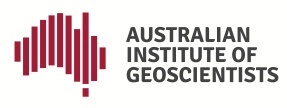
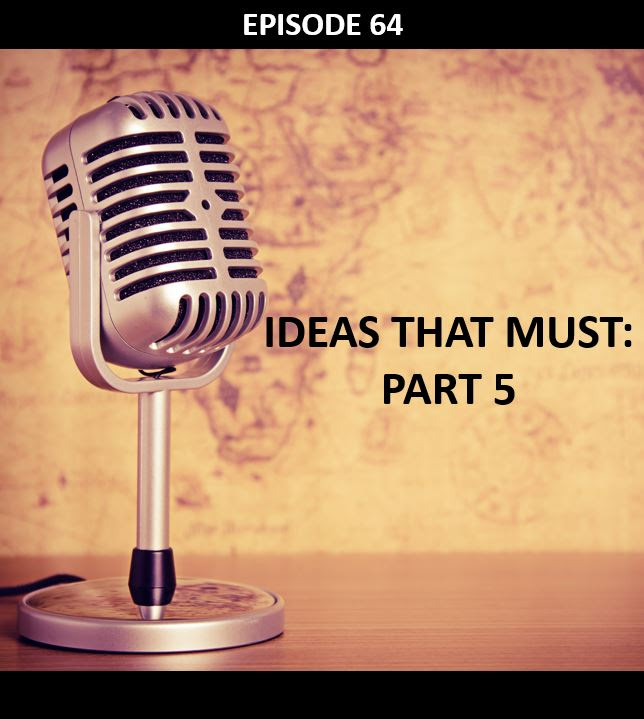

#63 – Ideas That Must – Part 4
At the end of our interviews, Steve and Ahmad always ask the guests two questions: what is something they think needs to live or be maintained in the mining industry at all costs; and what is something that needs to die or be jettisoned out of our industry?
We thought it would be interesting to put together some of the responses we have received to those questions over the past year.
So on this episode of Ideas that Must Die and Live in Mining, we are joined by, Eira Thomas, Chuck Fipke, Tony Reda, Aaron Schutt, Peter Betts, Kyle Prentice, Justin Osborne, Mark Jessell and Nicolas Thebaud.
Let’s explore.
#ExplorationRadio



The results of the latest quarterly snapshot of Australian geoscientist employment conducted by the Australian Institute of Geoscientists recorded a slight increase in both unemployment and underemployment (geoscientists able to secure less than one quarter of their desired workload) during the three months between July and September 2022.
The unemployment rate amongst geoscientists nationally was 3.5%. The under-employment rate was 6.3%. This compares with unemployment and under-employment rates at the end of March 2022 which were both 2.9%. There was no survey at the end of June 2022.
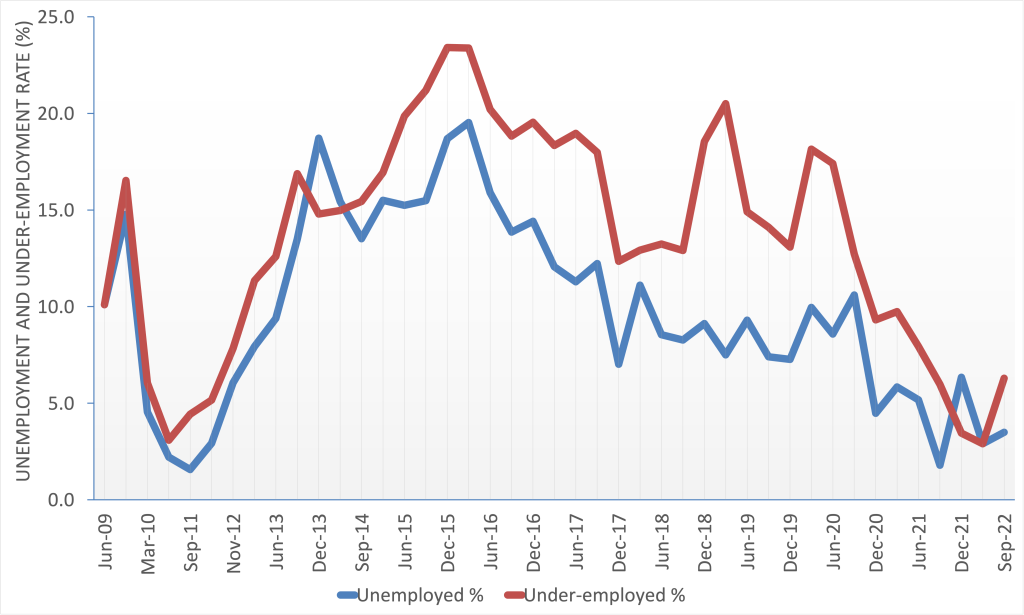
Australian geoscientist employment and under-employment June 2009 – September 2022
The latest results continue a general downward trend in unemployment and under-employment rates evident since March 2016. The unemployment rate was the sixth lowest recorded since this survey series commenced in June 2009.
Results varied markedly between states. No survey respondents from Victoria, South Australia and the Northern Territory reported being unemployed. The under-employment rates in Victoria, South Australia and the Northern Territory were 5.0%, 22% and 20% respectively.
Queensland recorded an unemployment rate of 2.3% for the quarter, followed by New South Wales at 3.6% and Western Australia at 4.5%.
The corresponding under-employment rates were 4.5% for Queensland, 6.0% for Western Australia and 7.1% for New South Wales.
Too few responses were received from Tasmania to enable rates to be stated with any confidence.
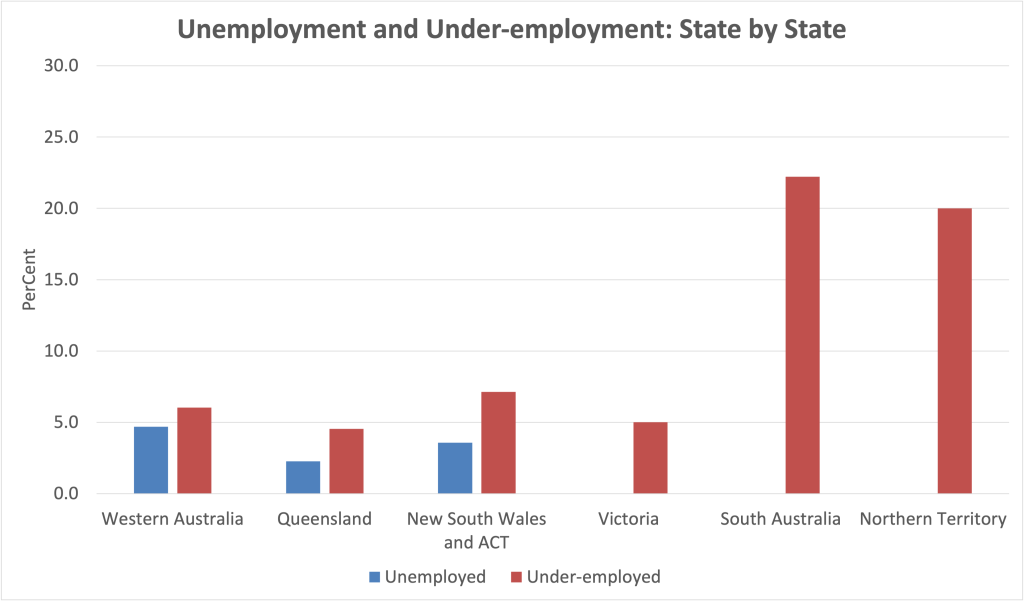
Geoscientist unemployment and underemployment rates by state – Q3 2022
Some 339 responses were received to the survey, representing around 6% of an estimated 6,000 professional geoscientists currently working or seeking work in Australia.
The survey recorded a decrease in long term unemployment, with 36% of survey respondents reported not having worked as geoscientists for more than 12 months. This figure remains high but is lower than that recorded in previous surveys.
Some 68% of respondents reported being employed full time, 2.7% part time and 4.7% on a casual basis. Some 25% of respondents were self-employed contractors and consultants, which represents a significant increase on previous surveys.
Junior exploration and mining companies were the leading source of employment opportunities, employing 33% of respondents. Major and mid-tier mining and exploration companies accounted for 14% and 15% of employment opportunities respectively. Public sector employers accounted for only 6.2% of geoscientist employment opportunities.
The ageing of Australia’s geoscience professionals is of increasing concern with more than 41% of respondents reporting having more than 30 years’ experience, putting them within 15 years of retirement. Early career geoscientists (less than five year’s experience) accounted for only 6% of survey respondents.
Gender imbalance remains a feature of our profession, with 85% of survey responses received from men and only 15% from women overall. When broken down into years of professional experience, the highest proportion of women in geoscience is amongst geoscientists with 5-9 years’ experience, where the rate peaks at 45%. The proportion of women in Australian geoscience declines as years of experience increases, except for a small increase in the range of 20-24 years’ experience, potentially attributable to women re-entering the profession.
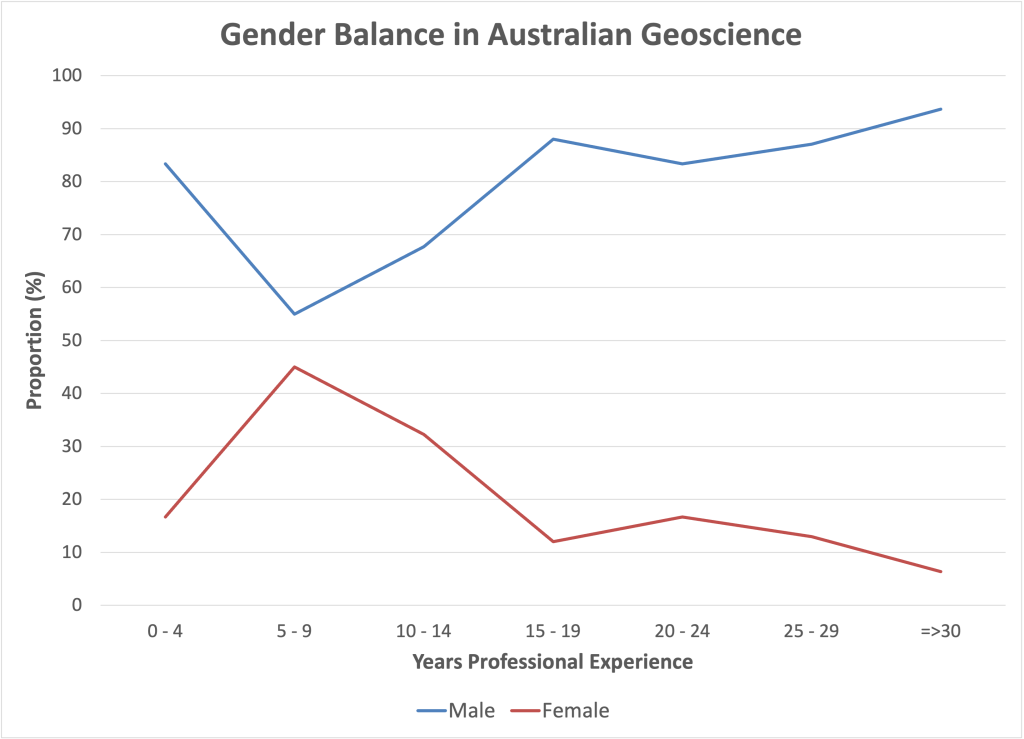
Gender balance vs years of professional experience in Australian geoscience.
The major concern in the chart is amongst early career geoscientists (0-4 years’ experience) where the survey results show very few women taking up geoscience as a career in recent times and pursuit of geoscience careers by women only slightly lower than the overall average rate of 85%. This data challenges a frequently quoted perception that women enter geoscience as a profession but do not remain in the profession long-term (i.e. for more than ten years), instead suggesting that women have not been taking up geoscience as a career for the past five years. The data could be a product of early career professionals not responding to the survey or engaging in professional activities and development opportunities provided by Australia’s professional institutes and learned societies, but this does not appear to be supported by survey contribution rates. Either way, the process of improving gender equity seen as a priority by our profession may be considerably more difficult than currently perceived.
The December quarter survey will open for contributions early, in the third week of December, and will remain open until mid-January 2023.
Andrew Waltho FAIG RPGeo

#60 – We All Want Agency with Evren Pakyuz-Charrier
Our guest today is Evren Pakyuz-Charrier, Lead Geologist at Oslandia, a company specialising in developing open-source GIS software.
Evren is looking to create bespoke open-source GIS solutions for the exploration and mining industry through QGIS, the most prominent open-source GIS software platform.
If you are a user of QGIS, you might want to listen to what Evren and Oslandia can do for you.
Let’s explore.
#ExplorationRadio


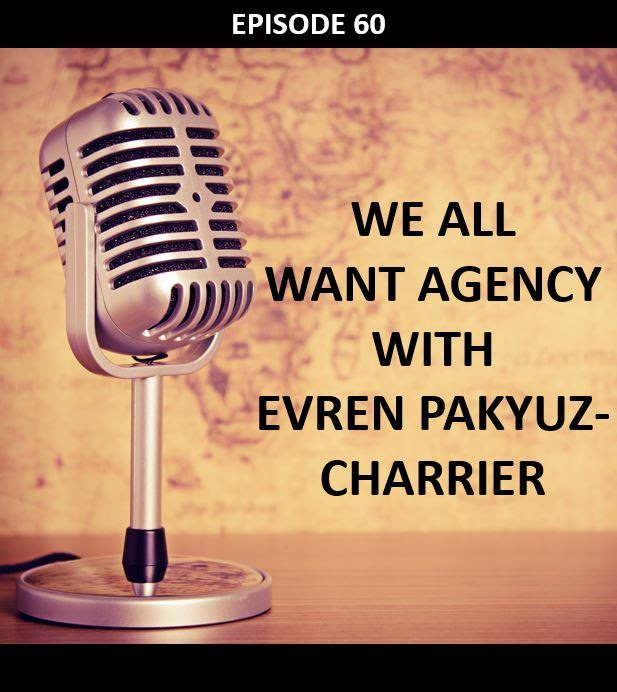

The JORC Committee is continuing to actively engage with the market operator (ASX) and regulator (ASIC). Discussions related to specific aspects of the draft Code are progressing, to ensure alignment between all parties, before engaging with wider stakeholder groups.
In parallel the Parent Bodies Joint Taskforce review of the Competent Person framework is underway and continuing, with updates to members provided by the AusIMM and AIG.
As a result of this ongoing engagement process and cognisant of the December – January holiday season, wider engagement and distribution of the draft revised Code will be delayed.
JORC remains committed to ensuring all stakeholders have the opportunity to review and comment on the draft, and as such, will be providing a 3-month period for comment. JORC will provide further details on this early 2023.
JORC is a joint committee of AIG, The Australasian Institute of Mining and Metallurgy (AusIMM) and the Minerals Council of Australia (MCA).
The contribution of Robert (Bob) Findlay was formally recognised last Sunday afternoon at Branch BBQ (30th October). Bob was instrumental and a driving force in the establishment of the Tasmanian Branch of the AIG and has been a constant member of the branch since its formation. Bob was a Board member (Director) of the AIG Boards, finally relinquishing the position in 2021. Over the years Bob has been involved in multiple career nights and has provided leadership experiences from the Artic to the Antarctic for early career geoscientists. Bob is currently the secretary for the Tasmanian Branch and continues to be key team member in the committee.
AIG needs to collect data from members to deliver benefits of membership. The integrity and security of members’ information, and preservation of member’s privacy is of paramount importance to our Institute.

Photo by Mikhail Nilov: https://www.pexels.com/photo/man-people-night-dark-6963062/
Membership Records
AIG’s membership database is arguably the Institute’s most valuable asset.
Applicants for membership are required to provide information needed to verify that they meet required education, professional experience and ethical conduct standards.
AIG’s membership database is managed using software and data management services provided by a specialist Sydney-based membership information system provider. All data is stored at Australian data centres and replicated daily across multiple sites to ensure continuity of access to information. Access to membership data is restricted to AIG officers and contractors directly involved in its management and analysis. The membership database is used to send membership-specific information, including renewal notices, general meeting and other important notices by email to all members. All current members are subscribed to this mailing list, which constitutes AIG’s principal means of distributing membership-specific information. Data security procedures followed by AIG’s service provider meet required international standards and are audited quarterly.
AIG does not provide member information to third parties at any time, under any circumstances.
Membership Information Search
A searchable list of AIG members is available via the AIG website. Required information (name, membership number, membership grade, state and RPGeo status) is extracted from the membership database, stored securely and accessible only to the membership query software on the website. Only a limited number of records can be viewed in response to a single query. Members may opt out of being included in this list.
AIG recommends that members who act as Competent / Qualified Persons for public reports issued through securities exchanges include their details in this list due to verifiable membership of a recognised professional institute being a requirement or expectation of acting in this capacity.
Credit Card Information
No credit card information is received by AIG in any form at any time. All credit card data required to process purchases is collected directly by AIG’s banking services provide (Commonwealth Bank of Australia) using secure web pages and forms provided by the bank’s electronic payments system. All information transfer is encrypted.
e-mail Newsletters
Newsletters including items of interest to members and information regarding continued professional development opportunities are distributed by e-mail to both members and non-members using an e-mail distribution system that:
Data held is limited to the email recipient’s name, email address and content preferences. Access to data is available only to AIG members and contractors directly engaged in preparing and distributing member communications.
Newsletter e-mail recipients must opt-in to receive newsletters and may opt-out at any time. AIG’s newsletter e-mail list is not made available to third parties.
AIG website
The AIG website is hosted in Australia. All AIG website traffic is transmitted to and from users of the website using encrypted links. The security of AIG’s website is continuously monitored and managed using both server and site-specific security systems that are continuously updated to prevent malicious content being passed on to website users.
Information collected by AIG from members may be subject to prescribed data retention requirements. Any information held in accordance with these requirements is destroyed by AIG at the end of the required retention period.
Commitment
AIG cannot guarantee that cyber-attacks or malicious use of information will never occur. AIG does, however, treat its obligations for security of information held by the Institute seriously. AIG has established continuously monitored, regularly updated and audited systems to protect information held on behalf of members.
www.agc.org.au/resources/reports/australian-geoscience-council-report/

#59 – Around the World in 80 Projects with Mike Porter
For decades, Mike Porter ran a business where he took people worldwide to various mine sites and deposits. These tours were open to anyone; somehow, Mike managed to navigate the red tape and get onto every mine site.
That was the magic of the Porter Geo International Study Tours.
Let’s explore.
#ExplorationRadio


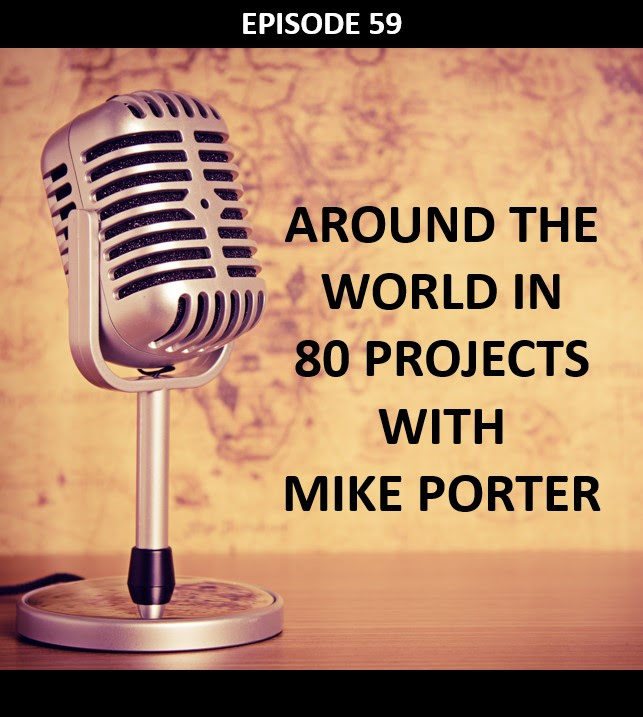
The Australian Institute of Geoscientists (AIG) is the leading Institute representing professional geoscientists employed in all sectors of industry, education, research and government throughout Australia (www.aig.org.au).
The Board of the AIG has commenced the process of recruitment of a Chief Executive Officer (CEO), with the successful candidate to join us as an employee ideally in early 2023. The primary role of the position is to support our volunteer teams who make AIG activities happen and to progress the delivery of AIG’s objectives. The CEO will report directly to the Board.
We invite expressions of interest from enthusiastic, energetic and capable persons with the following background and characteristics;
The AIG is committed to removing all barriers to participation due to age, gender, ethnic background or sexuality and to providing a safe and welcoming environment for all our members and guests.
To be considered in the recruitment process please forward your expression of interest with a brief covering letter (2 pages maximum length) along with a 1-page summary resume of professional experience to CEO@aig.org.au by COB Wednesday 16th November 2022.